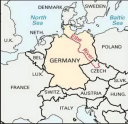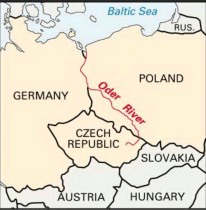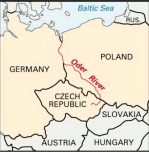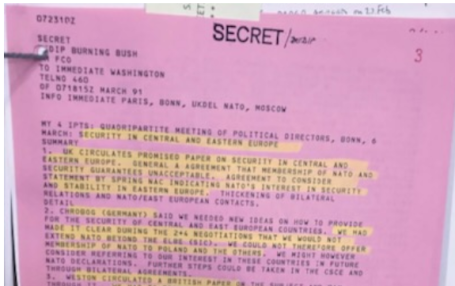.
US Assistant Sec. of State for Europe and Canada Raymond Seitz agreed: “We had made it clear to the Soviet Union both in the 2+4 and in other exchanges, that we would not take advantage of Soviet withdrawal from Eastern Europe. We must not provide a pretext for hardliners in the Soviet Union to build up Anti-Western feeling. NATO should not be extended formally or informally to the East.”
March 6, 1991, Minutes of “Quadripartite meeting of political directors, Bonn, 6 March, security in Central and Eastern Europe”…[UK, Germany, France, US]
p. 1, “Quadripartite meeting of political directors, Bonn, 6 March, security in Central and Eastern Europe…[UK, Germany, France, US]
1. UK circulates promised paper on security in Central and Eastern Europe. General agreement that membership of NATO and security guarantees
 2. Chrobog (Germany) said we needed new ideas on how to provide for the security of Central and East European countries. We had made it clear in the 2+4 negotiations that
2. Chrobog (Germany) said we needed new ideas on how to provide for the security of Central and East European countries. We had made it clear in the 2+4 negotiations that
we would not extend NATO beyond the Elbe (sic) [He meant Oder River, map below, not Elbe. Map, Elbe River].
We could not therefore offer membership of NATO to Poland and the others. We might however consider referring to our interest in these countries in future NATO declarations. Further steps could be taken in the CSCE and through bilateral agreements….4. [US Assistant Secretary of State for Europe and Canada Raymond] Seitz agreed. A series of visits by Eastern European leaders [page 2] to Washington were planned beginning with Walesa. The Poles and others were seeking bilateral declarations. The US would have to address security in this context.”…
 [page 2, continuing, Seitz]: “We had made it clear to the Soviet Union both in the 2+4 and in other exchanges, that we would not take advantage of Soviet withdrawal from Eastern Europe. We must not provide a pretext for hardliners in the Soviet Union to build up Anti-Western feeling.
[page 2, continuing, Seitz]: “We had made it clear to the Soviet Union both in the 2+4 and in other exchanges, that we would not take advantage of Soviet withdrawal from Eastern Europe. We must not provide a pretext for hardliners in the Soviet Union to build up Anti-Western feeling.
NATO should not be extended formally or informally to the East. The primary Eastern European objective and form of reassurance was the removal of Soviet troops….5. Chrobog [Germany] said we should also consider Bilateral treaties containing non-aggression elements. Such treaties should also be concluded with the Soviet Union.”…[Map, Oder River]
……………………………………………..
Added: 2/20/2022, “Has NATO reneged on a 1991 agreement with Russia?" EuroweeklyNews.com, Peter McLaren-Kennedy
“According to an article in Der Spiegel [subscription], a newly discovered document dated March 1991 shows that discussions between the West [which at the meeting consisted of UK, Germany, France, and US] and Russia made it clear
that NATO would not expand past East Germany,
an agreement that it appears to have reneged on….
The key text in the minutes from the meeting quotes US Assistant Secretary of State for Europe and Canada Raymond Seitz saying [UK Archives extract (PDF – 621.9 kb)]:
“We [the US] made it clear to the Soviet Union, in the 2+4 talks, as well as in other negotiations that we do not intend to benefit from the withdrawal of Soviet troops from Eastern Europe,” “NATO should not expand to the east, either officially or unofficially.”
A British representative also mentions the existence of a “general agreement”
that membership of NATO for eastern European countries
is “unacceptable.”
West German diplomat Juergen Hrobog [Chrobog] said of the 1991 agreement: “We [Germany] had made it clear during the 2+4 negotiations that we would not extend NATO beyond the Elbe [meant Oder].
We could not therefore offer Poland and others membership in NATO.”
 The minutes later clarified he was referring to the Oder River, the boundary between East Germany and Poland.
Hrobog [Chrobog] further noted that West German Chancellor Helmut Kohl
and Foreign Minister Hans-Dietrich Genscher had agreed with this
position as well. [Map, Oder River]
The minutes later clarified he was referring to the Oder River, the boundary between East Germany and Poland.
Hrobog [Chrobog] further noted that West German Chancellor Helmut Kohl
and Foreign Minister Hans-Dietrich Genscher had agreed with this
position as well. [Map, Oder River]
The document was found in the UK National Archives by Joshua Shifrinson, a political science professor at Boston University in the US. It had been marked “Secret” but was declassified at some point.
Shifrinson tweeted on Friday [Feb. 2022] he was “honoured” to work with Der Spiegel on the document showing that
“Western diplomats believed they had indeed made a NATO non-enlargement pledge.”
“Senior policymakers deny a non-expansion pledge was offered.
This new document shows otherwise,” Shifrinson said in a follow-up tweet, noting that
“beyond” the Elbe or Oder
by any standard includes Eastern European countries
to which NATO started expanding
NATO admitted Poland, Hungary, and Czechia in March 1999.
The next round of expansion in 2004 included the former Soviet republics of
Estonia, Latvia, and Lithuania,
placing NATO’s eastern frontier
just 135 kilometers (84 miles) from St. Petersburg….
Clearly the world moves on and situations change however
if the 1991 agreement does exist
then it is incumbent on those involved
and not to renege on the commitments made.”
……………………………………………………
Added: UK Archives extract
(PDF – 621.9 kb)
5/30/22, “British Archives: [March 6, 1991] London was opposed to NATO enlargement,” Voltaire Network
“A new document was recently extracted from British archives. It is dated 6 March 1991 and comes from
a file on the negotiations between the
United Kingdom, Germany and France.
It slightly precedes the “Wolfowitz doctrine”, which marked the penetration of the Straussians into the upper echelons of the US administration.
It highlights:
*the opposition of John Major’s government to requests for NATO membership and security guarantees from Eastern European countries (Poland, Hungary and others);
*Germany’s commitments during the negotiations for its reunification not to extend NATO east of the Elbe;
*the [John] Major government’s refusal to have NATO ensure peace in Eastern Europe, despite its fear of possible wars between the countries of the East, as well as to foment a spirit of revenge in Russia.
The paper advises against discussing with the countries of Eastern Europe as a group, promoting the development of bilateral relations. It advocates for the adoption of bilateral discussion structures and the negotiation of bilateral treaties that include elements of non-aggression.”
UK Archives extract
(PDF – 621.9 kb)
……………………………


No comments:
Post a Comment